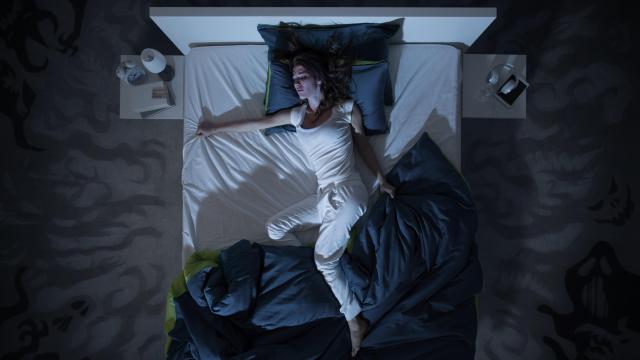We all deserve a good night’s sleep, which is why it’s frustrating when sweating keeps us from getting the rest we need. If you’ve ever woken up drenched in sweat after a night of tossing and turning, you know how unpleasant it can be. It’s one thing if you’re wearing flannel pyjamas in the middle of summer (bad choice), but it’s another thing if you’re consistently waking up sweaty, regardless of what you’re wearing to bed.
It could mean you need to see a medical professional — but first there are some environmental and behavioural changes you can make to increase your chances of getting a cooler night’s rest.
Why do we sweat at night at all?
“Our bodies sweat to eliminate waste products and to help to cool us down when overheated,” nurse and Noom coach Christina Graham says. “Sweat is composed of 99% water and 1% salt and fat. We constantly sweat, even when we aren’t feeling hot or exercising. We sweat more when we become overheated, losing from up to one quart to a few litres per day depending on activity level and heat exposure.”
But why do some of us tend to sweat at night more than others?
“The circadian rhythm controls our sleep-wake cycle. As bedtime nears, our body temperature begins to drop and signals the release of the sleep hormone melatonin,” Graham says. “Our core temperature drops throughout the night and then slowly rises towards the morning as we wake. A higher core temperature can lead to difficulty falling asleep, restless sleep, and a delayed time in both slow-wave and REM sleep, the deeper restorative stages of sleep.”
While sweat is an important and necessary physiological function, sweating at night can lead to interrupted sleep and lower quality sleep — not to mention the discomfort and hassle of waking up with damp pajamas or sheets.
Below are reasons you might be sweating at night, and how you might be able to cool down to have a restful sleep.
Your clothing may be the culprit
Are you wearing pajamas made from polyester, flannel, or satin? They can contain body heat. And if you’re wearing socks to bed, you’ll want to ditch those, too, as they also trap heat. According to Graham, you should opt for cotton or another breathable fabric, like silk, or a moisture-wicking pair of PJs. Or sleep nude.
Consider your sleep environment
This one might be obvious, but it’s important to keep your sleeping environment cool, which includes your room temperature, your bedding, and who you might be sleeping beside.
“Research shows the ideal ambient temperature for sleep is 60-67 degrees, so setting your thermostat lower and keeping a cool bedroom can decrease your chances of night sweats,” Graham says. “A warm room, cosy bedding, or sleeping close to a partner or pets; these can increase core body temperature and result in sweating as the body attempts to cool in preparation for sleep.
Interestingly, Graham says, slipping into warm sheets can initially help the core temperature drop by warming and shunting blood to the skin. “Still, prolonged time under a warm quilt can make us too warm and lead to uncomfortable night sweats.”
To keep cool, you should buy sheets made from cotton and bedding with low insulation. If you share a bed with a partner, you might want to purchase a comforter with different levels of insulation that works for each of you. If sharing your bed with a pet is getting too hot for comfort, consider buying them a pet bed to go on the floor — or shutting the door altogether.
You might need to adjust your dinnertime
That late-night bowl of pasta was delicious — but it may also cause night sweats.
“Eating a large meal within two hours of bedtime increases core body temperature as digestion expends energy,” Graham says. “It takes two to three hours to digest our food, so ensure you have plenty of time to digest after your last meal to avoid an elevated core temperature from food.”
Ideally, eat your last meal at least three hours before bedtime.
You might be exercising too late
You might like a good late-night run but that’s probably bringing on more perspiration than you bargained for.
“Exercising leads to an increase in core body temperature, leading to nighttime sweating,” Graham says. “It takes a few hours for the body temperature to drop after exercise, so sticking with morning, mid-day, or afternoon exercise is best.”
It could be hormonal
“Hormonal fluctuations can cause night sweats, especially the decline in estrogen for women in perimenopause or menopause,” Graham says. “This can also occur before or around ovulation, as estrogen and progesterone can influence the body’s temperature control.”
Consult your doctor first to ensure this is what’s going on, and try to tweak your bedtime routine with a cooler room temperature and cooling pajamas.
You may be experiencing a medication side effect (or have an infection)
“Certain medications and health conditions can cause night sweats, so it’s important to speak with your healthcare provider if your night sweats occur regularly and persist beyond making changes to your environment,” Graham says. “Some more common medications include antidepressants, hormone therapy, and drugs used to treat diabetes, which may cause hypoglycemic events.”
A fever and night sweats can also be signs of a possible infection, like the flu or COVID-19, so if you have other symptoms.
“See a doctor if night sweats occur regularly, are disrupting your sleep, or if you notice fevers, weight loss, fatigue, cough, or gastrointestinal symptoms,” Graham says. “If you’ve suffered from night sweats that don’t seem to resolve after making changes to your lifestyle or environment, it’s a good idea to speak with your doctor so they can investigate and rule out any serious causes.”

Leave a Reply
You must be logged in to post a comment.